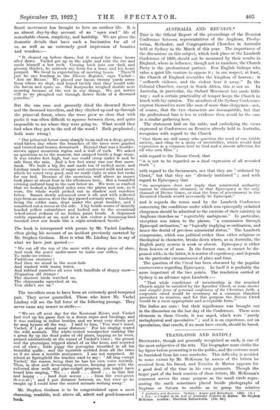AUSTRALIA AND REUNION.* This is the Official Report of the
proceedings of the Reunion Conference between representatives of the Anglican, Presby- terian, Methodist, and Congregational Churches in Australia held at Sydney in the March of this year. The importance of the discussions on this subject, which took place at the Lambeth Conference of 1920, should not be measured by their results in England, where in influence, though not in numbers, the Church
Party is the predominant partner. Few English bishops who value a quiet life venture to oppose it ; in one respect, at least,
the Church of England resembles the kingdom of heaven : it " suffereth violence, and the violent bear it away." In the Colonial Churches, except in South Africa, this is not so. In Australia, in particular, the Oxford Movement has made little way ; and a certain practicality of temper keeps the Church in touch with lay opinion. The members of the Sydney Conference express themselves more like men of sense than clergymen—not, of course, that the two characters are incompatible, but that the professional bias is less in evidence than would be the case in a similar gathering here.
The statement laid on the table, and embodying the views expressed at Conferences on Reunion already held in Australia, recognizes with regard to the Church
"that there are still many who question the need of one visible society, and cling to a unity of invisibility, which would find expression in a common love to God and a sincere affection for all who own Him " ; with regard to the Nicene Creed, that
"it is not to be regarded as a final expression of all revealed truth" ;
with regard to the Sacraments, not that they are "ordained by Christ," but that they are "divinely instituted " ; and with regard to Episcopacy that
"its acceptance does not imply that ministerial authority cannot be otherwise obtained, or that Episcopacy is the only channel of Divine Grace, or that the form of government in the Reunited Church would necessarily be Episcopal,"
and it regards the terms used by the Lambeth Conference concerning the conditions under which non-episcopally ordained clergymen should be admitted to the exercise of their ministry in Anglican churches as "regrettably ambiguous." In particular,
exception was taken to the phrase, "a commission through Episcopal ordination," as "logically implying re-ordination, and hence the denial of previous ministerial status." The Lambeth compromise, which was political rather than either religious or theological in character, breaks down where, as in Australia, the English party system is weak or absent. Episcopacy is either from heaven or of men. In the former case, it cannot be dis- pensed with; in the latter, it is matter of expediency, and depends on the particular circumstances of place and time.
The question of the Creed has been obscured by the popular controversies regarding Episcopacy. In itself it is probably the more important of the two points. The resolution carried at Sydney is an advance upon Lambeth :—
"That while conditions of membership in the reunited Church might be satisfied by the Apostles' Creed, or some shorter and simpler form of personal confession of the Christian faith, a corporate creed would be necessary as a common standard precedent to reunion, and for this purpose the Nicene Creed would be a most appropriate and acceptable form."
The italics are ours : but their significance was brought out in the discussion on the last day of the Conference. There were elements in these Creeds, it was urged, which were "purely metaphysical and speculative " ; and it is on experience, not on speculation, that creeds, if we must have creeds, should be based.


































 Previous page
Previous page